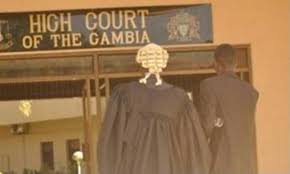By Dawda Faye
Nani Juwara, deputy managing director of NAWEC, today revealed to the Janneh Commission that Kanilai Group International (KGI) and Kanilai Family Farms (KFF) owe NAWEC the sum of D51, 681,155.

Nani Juwara
He reappeared in connection to the electricity extension for KGI in various regions as well as the Aqua Company.
According to him, Momodou B. Jallow made it very clear to NAWEC officials that he was more of a ceremonial MD and that Mr. Bazzi was fully in charge of the company. He added that Bazzi even summoned meetings and informed them that he could fire them but that he was not going to do that because of brotherhood.
He confirmed to the commission that he attended two meetings at the Standard Chartered House, summoned by Mr. Bazzi; adding that the taskforce leader was sharing the same office as the managing director of NAWEC.
In terms of finance, he said the MD usually endorsed payments but in consultation with GEG taskforce team. He said the MD could not endorse for payments without consulting the taskforce members.
Mr. Juwara, on his last appearance, was asked to produce documents relating to Kanilai International Group as well as that of a sewage company in The Gambia (Aqua) which he did and disclosed that there were several electricity extensions for KGI in various regions.
He informed the commission that the total liability for KGI and Kanilai Family Farms (KFF) is D51, 681,155 while for Aqua, he said they recently received five month’s payment from them.
Testifying earlier, the managing director of Euro Africa Group, Mr. Fadia Mazegi, explained that his company is currently executing contracts for NAWEC at Kotu Power Station which is a power plant.
He said there is another contract at Brikama being financed by BADEA and OFID to the tune of about $19,000,000; adding that for the Kotu contract the value was $20, 750,000 with 783,000 megawatt.
According to him, the Brikama power plant was commissioned in 2009 and it was correct that they were applying $1,000,000 per megawatt and that it was also correct that they supplied fuel for the IPP.
Mr. Mazegi testified that the fuel they supplied for the IPP was the same price as the Heavy Fuel Oil (HFO).
At this juncture, it was put to him by Counsel Bensouda that there was no fuel supply to Kotu Power Station. In response, he told the commission that there were two companies, namely Euro Africa Group and GEG. He added that Global Trading Group signed a contract with NAWEC but the execution was done by GEG.
It was again put to him by counsel that the IPP belongs to his company and asked him why they were charging themselves for transmission and transportation of fuel. He said the total value of the capacity charge was to the tune of $64,212,287 while the sum of $10,824,000 was deferred on the capacity charge.
Therefore counsel told him that the fuel they supplied to the IPP should have been cheaper but Mazegi maintained that there were different companies. However, he clarified that there was no contract between Euro Africa Group and GTG but the armlet was between Euro Africa Group and GEG.
Mrs. Bensouda also put it to him that what was owed for the capacity charge was 20 months, starting from January 2010, to August, 2011, which was confirmed by the witness.
On the discount cheques, he reveled to the commission that the invoices were marked ‘discount.’ However, he was asked to list the banks they owe and the liabilities NAWEC took over from them.
The business tycoon further disclosed that they owe the banks $29,000,000. He was again asked to give a breakdown of the total they owe the banks, and he promised to provide it to the commission. He also confirmed providing NAWEC with reconditioned generators but could not remember the cost.
Mr. Mazegi stated that SSHFC paid the sum of $183,000,000 for the generators while the sum of €4.3 million was the cost of two generators also bought by SSHFC.
It was put to him by counsel that it was after the generators arrived in 2010 that NAWEC was compelled to sign an agreement with their company, despite the fact that they were reluctant to do so due to the nature of the generators, but Mr. Mazegi said as far as he knew, he did not experience any complaint from NAWEC regarding the alleged second-hand generators and mode of operations by their companies.
He then asked why NAWEC did not write to complain that the generators were scrapped ones; adding that he did not know the reason why the former managing directors of NAWEC were arrested.
However, it was put to him by counsel that NAWEC then did not have the audacity to complain because they might end up at Mile II or got sacked. She then asked the witness whether he was ever arrested by the former government. In response, he said: “I was never arrested.”
On the Gam-Power purchase agreement, it was put to him that it was different from the one signed between NAWEC and GTG. He responded that the taskforce never touch NAWEC’s account. Again it was put to him that there was a penalty charge for SSHFC by GEG but he said that the penalty clause was not applied.
Mr. Mazegi confirmed that they have been occupying NAWEC premises at Fajara Booster Station since 2009, which he said was part of the agreement during the extension of the Kotu project. He was quick to add that he could not remember the person who signed the agreement from NAWEC.
On the projects funded by Venezuela, he told the commission that GTG was accorded 11 lots while a Finisian company was given 4 lots. It was put to him that his bid was deflated due to the liabilities his companies owed but he denied it. He said the sum they tendered for the bid was $11,000,000.
At this juncture, he was shown a copy of his statement, which he confirmed. He disclosed that he was not sure whether Ahmed Hodrog was one of the GTG directors.
Documents relating to the HFO contracts and a copy of his statement as well as other relevant documents were tendered and admitted in evidence.
Mr. Mazegi finally testified that he was never Mr. Bazzi’s right hand neither did he enjoy executive protection while executing his duties in The Gambia.
Hearing continues.


Ma sha Allah great and thanks for sharing